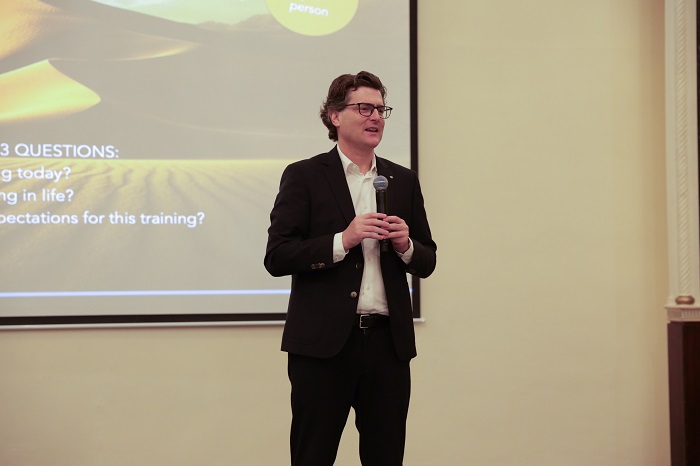
MUSCAT: His client list reads like a “who’s who” of global leadership. Be it the royal family of Saudi Arabia or prime ministers of countries or top leaders of world’s biggest corporates like Google, he has trained them, hosted leadership sessions and workshops for them, reflecting his extensive influence.
Meet renowned mindfulness expert Christoph Glaser, who has made a significant impact in the realm of emotional intelligence and mental wellness, and recently was a guest speaker in a successful three-day leadership training course in Oman.
This course, jointly organised by Transformational Leadership for Excellence (TLEX) Europe and The Art of Living (AOL) Oman, emphasised the transformative power of breathing techniques and emotional management to enhance personal well-being and corporate productivity.
As the CEO of TLEX Institute Europe, Glaser plays a pivotal role in integrating mindfulness into various sectors, focusing on enhancing emotional intelligence and resilience in both corporate and personal contexts.
His experience and training with Sri Sri Ravi Shankar, founder of the Art of Living, enriches his approach, combining ancient wisdom with contemporary practices to provide individuals and organisations with powerful tools for managing stress and improving mental clarity.
During his visit to Oman, Glaser stressed the critical need for mindfulness education in today’s fast-paced world, pointing out that traditional education often overlooks essential skills for managing emotions and thoughts.
“In school, we learn about geography and mathematics, yet we often miss out on lessons about handling negative emotions,” he remarked.
Advocating for mindfulness practices in educational curricula, he aims to better prepare future generations for the mental challenges of modern life.
Central to Glaser’s teachings are the breathing techniques that activate the parasympathetic nervous system, promoting relaxation and mental clarity.
He explained, “When stressful situations arise, our body’s fight-or-flight response kicks in. By practicing specific breathing exercises, we can counteract this response, achieving a state of calm and clarity, essential for both productivity and creativity.”
Throughout the three-day course in Oman, participants were guided through various mindfulness strategies and breathing exercises tailored to their needs. Attendees reported feeling more centered, energised, and equipped to tackle personal and professional challenges after the immersion, a testament to Glaser’s effective teaching methods.
Glaser’s programmes have been embraced by prestigious organisations, including Google, Accenture, Daimler, Shell, American Express, the World Bank, Harvard Business School, and various multinational corporations, all recognising the direct correlation between mindfulness and enhanced performance. “Many top executives understand that healthy employees lead to better productivity and a more creative work environment,” Glaser said, underscoring the growing importance of mindfulness in corporate culture.
In his commitment to democratising mindfulness, Glaser has launched various free resources, including a YouTube channel offering instructional videos on breathing techniques and mindfulness exercises.
He also recently published a book titled “Atmen” (translated as “Breathing”), subtitled “The Key to Successful Leadership,” which aims to provide accessible tools for individuals seeking to improve their mental and emotional health.
Reflecting on his personal journey, Glaser recalled early challenges in promoting mindfulness, especially in regions where such practices were not well understood.
A particularly memorable experience occurred in Madagascar, where he delivered a programme to senior government officials despite being initially uncomfortable with the language barrier.
“That experience taught me the importance of connecting on a human level, regardless of linguistic differences,” he shared.
Glaser’s message resonates across cultural boundaries, focusing on the belief that happiness derives from the quality of one’s thoughts rather than material success.
“True happiness lies in being present and grateful for what we have,” he advised, encouraging attendees to incorporate mindfulness into their daily lives.
At the Muscat workshop, titled “Self Leadership in an Agile World”, the presence of local men and women corporate leaders along with a sizable number of expatriates’ senior executives underlined the growing interest among people in the country to enhance their focus on mental health awareness. Glaser’s insights serve as a crucial reminder of the transformative power of mindfulness.
In a world increasingly designed to foster stress, Glaser, who is also Managing Director of the World Forum for Ethics in Business, which organises annual conferences at the European Parliament, stands at the forefront of the movement towards emotional wellness.
By inspiring individuals and organisations alike, he champions the concept of mindfulness as a vital path to a balanced and fulfilling life.
For those interested in exploring mindfulness further, following Glaser’s initiatives offers a wealth of resources to tap into the potential of this powerful practice.
Glaser has over 25 years of management experience in various business organisations and is also serving as managing director at the World Forum for Ethics in Business.
He holds a master’s degree in public policy from the Humboldt-Viadrina School of Governance in Berlin and graduated with honours from the Business School Basel.
A certified Leadership trainer for the World Bank Group’s ‘Greater than Leadership’ programme, Glaser has led leadership programmes across the world in over 50 countries.